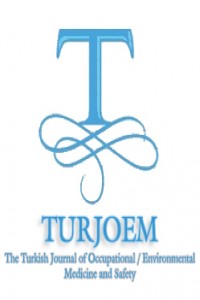INVESTIGATION OF 3-METHYL-5-(4 CARBOXYCYCLOHEXYLMETHYL)-TETRAHYDRO-2H-1,3,5-THIADIAZINE-2-THIONE GENOTOXICITY IN HUMAN PERIPHERAL LYMPHOCYTES USING COMET ASSAY
Abstract
Tranexamic acid
is a drug for curing abnormal bleeding in a variety of diseases. In a previous
study, twelve tetrahydro-1,3,5-thiadiazine derivatives were synthesized from
the amine group of tranexamic acid. Their antifibrinolytic and antimicrobial
activities were compared to tranexamic acid. Among them, 3-methyl-5-(4
carboxycyclohexylmethyl)-tetrahydro-2H-1,3,5-thiadiazine-2-thione (3-MTTT) is
the most remarkable and this compound may be used as a drug. In this study, the
in vitro genotoxic effect of 3-MTTT was investigated using comet assay in
isolated human peripheral lymphocytes. Lymphocytes obtained from two healthy
young donors were treated with six different concentrations (0,78; 1,56; 3,13;
6,25; 12,50 and 25,00 µg/mL) of test compound. A negative, a solvent (PBS) and
a positive control (H2O2) were maintained for each
treatment. Three different parameters (tail length, tail intensity and tail
moment) were evaluated in the comet assay. Comet assay is used for the
detection of breaks in DNA strands (double strand breaks and single strand
breaks). This study demonstrated that 3-MTTT did not induce DNA damage at all
the concentrations. 3-MTTT did not induce chromosomal aberrations in human
lymphocytes either. This and previous results indicate that 3-MTTT has no
genotoxic risk at these concentrations in human peripheral lymphocytes.
References
- Ece Avuloğlu YILMAZ, Deniz YÜZBAŞIOĞLU, Azime Berna ÖZÇELIK, Fatma ÜNAL, Seyhan ERSAN
- Gazi University, Faculty of Science, Department of Biology, Genetic Toxicology Laboratory, Ankara-Turkey Gazi University, Faculty of Pharmacy, Department of Pharmaceutical Chemistry, Ankara- Turkey
Abstract
References
- Ece Avuloğlu YILMAZ, Deniz YÜZBAŞIOĞLU, Azime Berna ÖZÇELIK, Fatma ÜNAL, Seyhan ERSAN
- Gazi University, Faculty of Science, Department of Biology, Genetic Toxicology Laboratory, Ankara-Turkey Gazi University, Faculty of Pharmacy, Department of Pharmaceutical Chemistry, Ankara- Turkey
Details
| Journal Section | Articles |
|---|---|
| Authors | |
| Publication Date | February 16, 2017 |
| Published in Issue | Year 2017 Volume: Volume 2 Issue: İssue 1 (1) - 2.İnternational Congress Of Forensic Toxicology |


